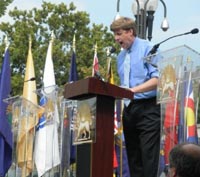Former U.S. Rep. Patrick Kennedy (D-RI) told ThinkProgress he was paid $25,000 to speak at a 
Kennedy wouldn’t tell Foreign Policy’s Josh Rogin whether or not he was paid to speak at the rally to remove the Mujahedeen-e Khalq (MEK) from the State Department list of foreign terror organizations. But asked by ThinkProgress, Kennedy replied that he had been paid $25,000 and that he wouldn’t accept the money if he didn’t believe in the cause:
 |
|
Kennedy at pro-MEK rally (photo: Josh Rogin) |
THINKPROGRESS: Were you paid for this appearance or the other one?
KENNEDY: Yes, I have.
THINKPROGRESS: Do you mind if I ask how much it was?
KENNEDY: Y’know, $25,000.
THINKPROGRESS: By whom?
KENNEDY: By the Iranian-American diaspora. […] I have no problem with it. I wouldn’t support a group just because I was paid for it if I didn’t believe in them. And the implication of some of these questions is, “Well, if you’re getting paid you must be getting paid for something you don’t agree with.” […]
The real thing is that the money is being funneled out of Tehran to oppress this group. So let’s be balanced when people start talking about follow the money.
The MEK has been on the U.S. list of terror groups since 1997, which prevents members from traveling to or raising funds in the U.S. The group, whose leadership is based in Paris while about 3,400 members live in a camp in Iraq, renounced violence in 2001 and was forcibly disarmed by the U.S. in 2003. Critics allege that the group’s renunciation of violence may not be genuine, de-listing them could hurt Iran’s indigenous Green opposition movement, and that the group has no backing inside Iran as a democratic opposition group.
The camp in Iraq, called Ashraf, was under U.S. control until 2009 when the U.S. handed over security control to the Iraqis as part of a larger deal. Since then, residents of Ashraf have accused Iraqi forces of abuses including attacks that reportedly killed dozens of members of the group.
Speaking before a large crowd outside the State Department that included attendees bused-in from afar on all-expenses-paid trips, Kennedy cited one such attack — in April, which reportedly killed 34 Ashraf residents — as having spurred his support for the group.
The campaign to de-list the MEK has drawn attention because of the millions of dollars spent on the effort.
Kennedy joins other former U.S. officials, mostly from conservative circles but including some liberals, such as former-Vermont governor and DNC chairman Howard Dean.
To cheers from the crowd, Kennedy — invoking the memory of his father, the late Sen. Ted Kennedy (D-MA), and his uncle, President John F. Kennedy — compared the MEK’s Paris-based leader Maryam Rajavi to South Africa’s first post-Apartheid leader Nelson Mandela, who led a spate of guerrilla sabotage bombings against the Apartheid regime before going to prison and eventually leading the country’s transition. (Mandela admits his guerilla past and his group’s human rights abuses. Rajavi’s MEK often denies having committed any acts of terror over it’s 45 year history and disputes allegations made by Human Rights Watch about abuses against the group’s own members.)
Kennedy told ThinkProgress his work to de-list the MEK and support for them as a democratic Iranian opposition was in line with his long-standing support of human rights worldwide.
By Ali Gharib and Zaid Jilani – Think Progress

